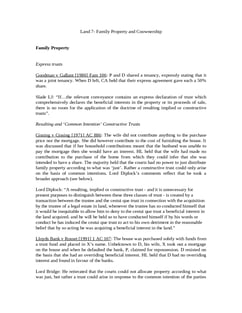Kreglinger v New Patagonia Meat Company [1914] AC 25
Judgement for the case Kreglinger v New Patagonia Meat Company
Table Of Contents
Under the terms of a mortgage, the mortgagee was to have the right of first refusal on products produced by the mortgagor.
Mortgagor claimed that this collateral advantage could not have effect once the debt was repaid as this would infringe the principle of redemption.
HL rejected this, overturning its previous position and enforce freely made contractual obligations instead.
-
It ruled that collateral advantages continue to operate once the debt is repaid except where:
It is unreasonable/unfair; or
If it operates as a penalty, clogging equity of redemption; or
Is repugnant to the right to redeem (per Lord Parker).
Lord Parker
There is no reason why a term of a mortgage agreement should be invalidated on grounds not applicable to other types of mortgage.
Unconscionability, duress and undue influence (and nowadays the protection under UTCCR, UCTA and consumer credit legislation) are adequate protection for borrowers against exploitation.
Viscount Haldane LC
The rules on not clogging mortgages have turned into technicalities capable of defeating their actual purpose.
Lord Mersey
The rule of equity on redemption has to be strictly confined lest it wander into areas it ought not to enter, like “an unruly dog”.
RELATED CASES
For Further Study on Kreglinger v New Patagonia Meat Company
Need instant answers? Our AI exam tutor is here to help.
Ask questions 🙋 Get answers 📔 It's simple 👁️👄👁️
Our AI is educated by the highest scoring students across all subjects and schools. Join hundreds of your peers today.
Get StartedSimilar Cases
Related Product Samples
These product samples contain the same concepts we cover in this case.
| Land Law | The Equity Of Redemption Notes (8 pages) |

